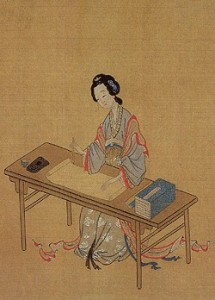
'We are proud of participating in the founding of our country's industrialization!' (1954; from chineseposters.net)
It’s been interesting, as a woman-journalist-that-once-was – I’m not sure I still count among the illustrious crew anymore, having mostly been resting on my laurels for the past few years, but I was once – interesting and sad and irritating and all sorts of things.
I was never made to be uncomfortable at Kotaku – part of that was my own design (and listening to Ian Bogost’s admonition not to read the comments! – which I pass along on Twitter to this day), part of it was the fact that I generally shied away from writing about gender and sex, part of it was the fact that most of the audience (if not always the most vociferous) weren’t into making irrelevant, sexist commentary. I did do at least one long form essay on the subject of sexuality and gender, and I’m sure the comments were a mix of thoughtful conversation, some ‘What? This again?’, and a smattering of ‘tl;dr’ or ‘Maggie is such a pedantic bitch’ (I wonder sometimes if the vitriol that was occasionally directed at me for looking down on my audience and thinking Kotaku readers were stupid and generally being a stuck up bitch would have been lobbed had I been male; I honestly don’t know). I think I wrote that under the ‘Everyone must produce feature articles’ phase of my employment, and I had been thinking about eroticism in Chinese movies (specifically, the subtle foot squeeze in Red Sorghum (红高粱 Hong gaoliang) and the wonderful tension present in the Maggie Cheung/Tony Leung pairing of In the Mood for Love (èŠ±æ¨£å¹´è¯ Huayang nianhua)).
However, that was not my first brush with issues of sex and gender and games. My first experience with writing ‘criticism’ was on the subject of sex and gender in games; it wasn’t terribly sophisticated, but I was about 22, so I try and cut myself a little slack. It appeared on Slashdot, and the comments literally made me cry. I remember being too horrified and hurt to even look away. It probably was a stupid essay, and perhaps was only parroting things that had been said before (and better), and almost certainly wasn’t a shining example of the genre. But I had never in all my life been subject to the kind of commentary thrown at me (and never since – whatever one wants to say about the Kotaku comments section, comments were moderated to a greater extent and people did get banned). ‘Clearly she just doesn’t get fucked enough,’ or ‘Must be a fat, bitter bitch – anyone have a picture?’ – and on and on and on. It was shocking and hurtful and offensive.
Here I will say that I have absolutely benefited from privilege-with-a-capital-P – maybe it shouldn’t have taken until I was 22 to realize that people who didn’t want to engage with me on an intellectual level would simply hurl insults based on my gender instead, but the only place this has ever happened to me personally is when writing about games. No academic paper reviewer, no matter how monstrous, would return an essay with the notation that ‘Clearly this author doesn’t get laid enough and probably does not fit into culturally accepted standards of beauty, which is obviously impacting her ability to engage with post-colonial interpretations of subjectivity.’ I realize some of this is just the vagaries of the internet, but honestly. I bristle at the implication that comes out sometimes, the one that says that we should just get used to it, and things will change … someday. In the meantime, toughen up, cupcake.
I hadn’t killed any kittens or mugged any grandmothers; I had simply been audacious enough to write an essay that was linked by Slashdot. An essay about what I as a woman who wrote about games would like to see in the games that I played. The nerve I had as a youngster.
In any case, that early experience had a rather large impact on how I conducted myself later. I generally think I flew pretty under the radar. At Kotaku’s E3 party in 2008, I hid outside on the smoking patio, sharing a couch with Mike Fahey and an assortment of people who passed by during the course of the evening. No one recognized me – a strange position to be in, since everyone else I worked with seemed so visible, but not an unexpected one. I avoided putting a face to my posts and making things ‘too’ personal, occasionally in stark contrast to my coworkers. The only photographic evidence readers got of me was my bookshelf (unimpeachably academic and wonderful!) and my dog (way too cute to insult).I wonder if any of my male colleagues, the ones writing under their own names, ever felt nervous about putting a picture of themselves out there for public consumption. I did. I posted one picture of me as an adult on Kotaku, and that was with my goodbye letter – I was already halfway out the door, if someone wanted to call me a fat pig as a parting shot, more power to them (no one did). Even my user icon was a game character and not a photo. I liked sharing bits of my life with the audience, but I never wanted to be too out there – and by ‘too out there,’ I mean using a photograph of myself, not spilling out my deepest, innermost fears and dreams on there interwebs – lest it could be used against me.
Yes, that speaks deeply to my own personal insecurities, ones that are quite independent and alive separate from the sphere of games writing, but nevertheless: that run-in with utterly inappropriate, extremely hostile, very-much-tied-to-my-gender commentary did have a significant impact. I couldn’t – still can’t, actually – imagine anyone using my male colleagues’ bodies as criticism of their writing: ‘Brian Crecente’s opinions are stupid because he’s unattractive’; ‘Simon Carless must be fat and bitter, that’s why I don’t like his essay’; ‘I need to see a photograph of this Ben fellow before I determine my feelings about his writing.’ No, I don’t think everyone – or even a majority – of people in the industry, or people who follow blogs and critical discourse, would say (or even think!) such things. But it doesn’t take much of a minority, just a vocal one, to drown out all the other voices.
It saddens me that we’re still having the same conversations we had years ago, despite what seems to be an increase in visible female writers and critics.
But I agree with those that say people are ‘tired’ of the talk of sexism, it’s all been said before, and any current debate will simply rehash that. I am alarmed by the notion that “gender will stop being an issue when we stop acknowledging that there is a divide.” There is a divide. Refusing to acknowledge the divide just means … refusing to acknowledge it (the author more or less contradicts herself a few sentences later & appears to advocate for people speaking up, but this sort of idea – that talking about an issue is what propagates it – is definitely in play well beyond the game blogosphere. I think it’s a lie, a dangerous one at that, and we should stop throwing it out there. Not talking about an issue will never resolve it, just make it easier to ignore). But I do understand the dislike of talking about it, and the exhaustion with the subject. There is fatigue that sets in as we go round and round in circles and nothing ever really changes.
There’s a fine line here, at times a contradictory one, but I think it’s one that we collectively walk every day in different permutations. I am a woman. I don’t want people to flatten that out and not see my gender (because what usually happens when gender magically “disappears” is categories collapse into one appropriate one, the default being heterosexual male, with differing experiences ridiculed or ignored), but that’s not the only thing that defines me, or even the most important one. But it is part of me. I don’t often think of my gender in relation to my academic work, for example (primarily because I exist in a comfortable, supportive ecosystem in my program). But I am always aware that my experience has been shaped to larger and smaller degrees by being female. It’s not the most important characteristic I use to define myself by far, but it is more than just a box to check on standardized forms.
I’m currently reading a collection of essays published by acclaimed women writers who grew up under Mao – Wu Hui’s wonderful Once Iron Girls: Essays on Gender by Post-Mao Chinese Literary Women. The experiences and ruminations of these writers – most of whom were once told they were “iron girls,” that they held up half the sky, that they were equal (and indeed, did do everything that men did and then some; but ‘a new woman is just like a man’) – is packaged neatly and tightly. Some of the essays are absolutely brutal; most will at least give the reader pause. I’ve certainly been examining my own life in contrast. Here’s the introductory paragraph by an essay by Lu Xing’er called “Women and the Crisis”:
In recent years, I have been thinking about women’s issues and written about them in a fiction series. I plan to continue writing about these issues in the future. Indeed, since ancient times, woman has never failed to be a topic involving prolonged, heated discussions. I am sure that women will continue to be talked about, in depth and forever. However, women’s situation and future will see few fundamental changes, despite so much writing, thinking, and discussing.
I said “fundamental,” not superficial.
(Ouch)
I would like to think Lu is wrong. I’m hardly the poster child for optimism (if something can be worried about, I can worry about it like a true champion worrier/pessimist), but I would really, really like to think she’s wrong, both on a big scale and on a smaller scale like … the community that writes about videogames.
Here is a slightly more positive take on getting over the gender divide: “Androgyny” (which can also be rendered as “neutrality”) by Bi Shumin:
Androgyny is different from saying that women can do whatever men can do. This statement identifies women as a little boat managing to get close to the mens large ship. In contrast, androgyny is the lighthouse. Toward its welcoming lights both men and women move forward, helping and enabling one another, leaving no one behind.
I have been lucky in my academic career to not brush up against overt sexism from professors or classmates, as I mentioned above. Reading Katie Williams’ response to the Freeplay panel was painful – not because it reminded me of my own experience, but because it was so foreign, and no one ought to feel like that, nor should it be tolerated by those in a position of power. It underscores the futility of staying quiet. I wonder if we haven’t done ourselves a great disservice by distancing ourselves from the discussion, saying we’re not interested in those kinds of issues. I hasten to say that I would have no interest in focusing exclusively on gender issues, but sustained conversation could be a good thing – both in public and in more private (possibly ‘safer’) spaces. I’ve never had the opportunity to sit around with other female journalists and critics and talk about our experiences, and it’s something I would be interested in doing.
Obviously these issues go way, way beyond a conference in Australia and women who write about games. I hope one day, Lu Xing’er will be proved wrong. Until then, I’ll simply wish for thoughtful and sustained discussion on issues that impact all of us, female or not.



